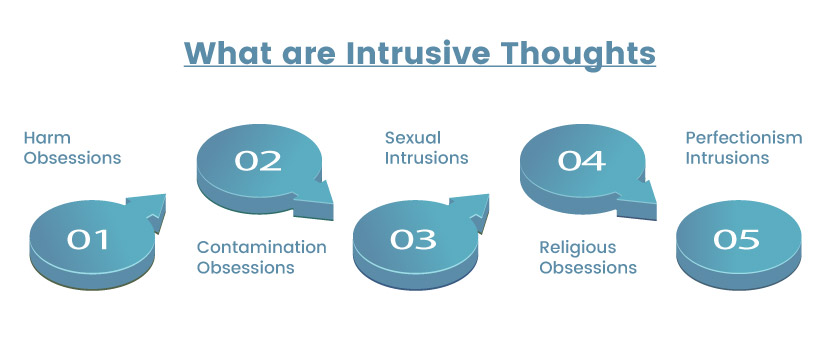
Intrusive Thoughts VS Impulsive Thoughts: Understanding the Difference

Intrusive thoughts versus impulsive thoughts! These mental phenomena may sound similar, but they inhabit different corners of our cognitive landscape. Intrusive thoughts are like uninvited guests at a party, popping into our minds unexpectedly and often causing distress. Impulsive thoughts are more like sudden impulses or urges that lead to spontaneous actions without much forethought.
Mental health experts and researchers emphasize the importance of understanding these distinctions to navigate the complexities of our inner workings and to promote mental well-being. So, let’s explore this journey of comprehension together, unraveling the mysteries behind intrusive and impulsive thoughts.
Why it is Essential to Understand Intrusive & Impulsive Thoughts Difference
Understanding the disparity between intrusive and impulsive thoughts is crucial for several reasons. Firstly, it aids in accurate self-awareness and introspection, allowing individuals to recognize and label their thought patterns appropriately. By discerning between intrusive and impulsive thoughts, one can better manage and cope with them, thereby reducing unnecessary anxiety or distress.
Moreover, comprehending these differences enables individuals to make informed decisions about seeking professional help if needed, as certain mental health conditions may manifest through persistent intrusive thoughts or impulsive behaviors.
Additionally, grasping the between these types of thoughts fosters empathy and understanding in interpersonal relationships, as it allows for more effective communication and support when discussing mental health challenges.
What are Intrusive Thoughts

Intrusive thoughts are unwelcome and involuntary mental images, memories, or scenarios that repeatedly enter one’s mind, often causing distress or anxiety. These thoughts can range from mild nuisances to severe disturbances, and they may vary in content and intensity depending on the individual.
- Harm Obsessions: Sudden, distressing thoughts about causing harm to oneself or others, such as imagining pushing someone in front of a train.
- Contamination Obsessions: An irrational fear of contamination, leading to obsessive thoughts about germs or dirt, like imagining contracting a deadly illness from touching a doorknob.
- Sexual Intrusions: Unwanted sexual thoughts or images that feel intrusive and inappropriate, such as imagining engaging in sexual acts with someone you’re not attracted to.
- Religious Obsessions: Intrusive thoughts related to religion or blasphemy, like fearing punishment for having impure thoughts about sacred figures.
- Perfectionism Intrusions: Persistent thoughts about making mistakes or not living up to one’s own high standards, such as replaying past conversations and obsessing over perceived errors.
Causes of Intrusive Thoughts
The causes of intrusive thoughts can vary widely and are influenced by a combination of biological, psychological, and environmental factors. While everyone experiences intrusive thoughts from time to time, some individuals may be more susceptible due to underlying mental health conditions or life experiences.
Here are some common causes of intrusive thoughts:
Anxiety Disorders: Conditions such as generalized anxiety disorder (GAD), obsessive-compulsive disorder (OCD), and post-traumatic stress disorder (PTSD) can all contribute to the prevalence of intrusive thoughts.
Trauma: Past traumatic experiences, including abuse, accidents, or witnessing distressing events, can lead to intrusive thoughts as the mind grapples with processing and coping with the trauma.
Stress: High levels of stress or pressure in daily life can increase the frequency and intensity of intrusive thoughts as the mind becomes overwhelmed and struggles to maintain focus.
Genetics: Some research suggests that genetics may play a role in predisposing individuals to certain mental health conditions associated with intrusive thoughts.
Neurochemical Imbalances: Imbalances in neurotransmitters, such as serotonin or dopamine, may contribute to the development of intrusive thoughts, particularly in individuals with mood disorders.
Environmental Triggers: Certain environments or situations, such as being in crowded spaces or experiencing relationship conflicts, can trigger intrusive thoughts for some individuals.
How to manage intrusive thoughts?
Managing intrusive thoughts can be a multifaceted process that involves both practical strategies and emotional resilience.
One approach is cognitive-behavioral therapy (CBT), which aims to identify and challenge negative thought patterns associated with intrusive thoughts. This therapeutic technique helps individuals develop coping mechanisms, such as mindfulness and relaxation exercises, to reduce the impact of intrusive thoughts on their daily lives.
Additionally, practicing self-compassion and acceptance can be beneficial, as it allows individuals to acknowledge their intrusive thoughts without judgment or self-criticism.
Engaging in regular physical activity, maintaining a healthy lifestyle, and seeking support from friends, family, or mental health professionals can also play a crucial role in managing intrusive thoughts effectively.
By implementing these strategies and cultivating a supportive environment, individuals can empower themselves to navigate the challenges posed by intrusive thoughts and foster greater mental well-being.
What are Impulsive Thoughts?
Impulsive thoughts are sudden, often fleeting urges or impulses that arise without much prior deliberation or consideration of consequences. These thoughts can prompt impulsive behaviors or actions, leading individuals to act on instinct or desire in the spur of the moment.
Impulsive thoughts may stem from various sources, including emotions, desires, or external stimuli, and they often manifest as strong, irresistible urges that demand immediate gratification.
- Spending Spree: Feeling the sudden urge to make impulsive purchases, whether online or in-person, without considering budget constraints or long-term financial goals.
- Indulgent Eating: Craving unhealthy or excessive food choices and giving in to the temptation without considering nutritional value or dietary restrictions.
- Reckless Driving: Feeling the impulse to engage in risky driving behaviors, such as speeding or weaving through traffic, without regard for personal safety or traffic laws.
- Impulsive Relationships: Developing intense feelings of attraction or infatuation with someone and acting on them impulsively without considering compatibility or potential consequences.
- Substance Abuse: Experiencing the urge to consume drugs or alcohol in excessive amounts to alleviate stress or seek pleasure, disregarding the negative impact on health and well-being.
Causes of Impulsive Thoughts?
Impulsive thoughts can arise from a variety of underlying factors, spanning psychological, biological, and environmental influences. Understanding these causes is crucial for effectively managing impulsive behaviors and promoting mental well-being. Here are some common causes of impulsive thoughts:
Neurobiological Factors: Irregularities in brain chemistry or function, such as imbalances in neurotransmitters like dopamine or serotonin, can contribute to impulsive thoughts and behaviors.
Genetics: Research suggests that genetic predispositions may play a role in the development of impulsivity, with certain genetic markers linked to increased impulsivity and risk-taking behavior.
Psychological Conditions: Mental health disorders such as attention-deficit/hyperactivity disorder (ADHD), bipolar disorder, and borderline personality disorder are often associated with impulsivity, as they can affect impulse control and emotional regulation.
Trauma and Stress: Past traumatic experiences or chronic stress can trigger impulsive thoughts and behaviors as coping mechanisms to alleviate emotional distress or regain a sense of control.
Environmental Influences: Environmental factors such as upbringing, social influences, and peer pressure can shape one’s propensity for impulsive thoughts and actions, particularly during formative stages of development.
Substance Abuse: The use of drugs or alcohol can impair judgment and impulse control, exacerbating impulsive tendencies and leading to reckless behavior.
How to manage Impulsive Thoughts?
Managing impulsive thoughts requires a combination of self-awareness, cognitive strategies, and behavioral techniques to regulate impulses and promote healthier decision-making effectively.
One approach is to practice mindfulness and self-reflection, allowing individuals to observe their thoughts without immediately acting on them. Cognitive-behavioral techniques, such as cognitive restructuring and thought challenging, can help individuals identify and challenge irrational or impulsive thoughts, replacing them with more rational alternatives.
Engaging in regular physical exercise, maintaining a balanced lifestyle, and prioritizing self-care activities can also help reduce stress and impulsivity. Additionally, developing and adhering to structured routines and plans can provide a sense of stability and control, minimizing the likelihood of impulsive behaviors.
Seeking support from mental health professionals or participating in therapy can further aid individuals in developing coping strategies and enhancing impulse control. By employing these techniques and cultivating a supportive environment, individuals can effectively manage impulsive thoughts and lead more fulfilling lives.
Intrusive Thoughts VS Impulsive Thoughts: Similarities and Differences
Intrusive thoughts and impulsive thoughts, while both involving the realm of cognition, differ significantly in their nature and impact. Intrusive thoughts are unwelcome, involuntary mental images, memories, or scenarios that repeatedly enter one’s mind, often causing distress or anxiety.
On the other hand, impulsive thoughts are sudden, often fleeting urges or impulses that arise without much prior deliberation or consideration of consequences, prompting impulsive behaviors or actions.
While both types of thoughts can be disruptive and distressing, they manifest differently and have distinct underlying mechanisms.
Aspect | Intrusive Thoughts | Impulsive Thoughts |
Nature | Unwelcome, involuntary | Sudden, often fleeting |
Triggered by | Anxiety, stress, trauma | Emotions, desires, stimuli |
Frequency | Persistent, recurring | Sporadic, occasional |
Consequences | Emotional distress, anxiety | Impulsive actions, regret |
Management Strategies | Cognitive-behavioral therapy, | Mindfulness, cognitive-behavioral |
relaxation techniques | techniques, impulse control |
The Bottom Line
Understanding the distinctions between intrusive and impulsive thoughts is essential for navigating the complexities of our mental landscape. While both types of thoughts can be disruptive and distressing, they differ significantly in their nature, triggers, and consequences. By recognizing these differences and employing appropriate management strategies, individuals can effectively cope with intrusive and impulsive thoughts, promoting greater mental resilience and well-being.
Whether through mindfulness practices, cognitive-behavioral techniques, or seeking professional support, empowering oneself with knowledge and tools can lead to a healthier relationship with one’s thoughts and emotions.
- Why it is Essential to Understand Intrusive & Impulsive Thoughts Difference
- What are Intrusive Thoughts
- Causes of Intrusive Thoughts
- How to manage intrusive thoughts?
- What are Impulsive Thoughts?
- Causes of Impulsive Thoughts?
- How to manage Impulsive Thoughts?
- Intrusive Thoughts VS Impulsive Thoughts: Similarities and Differences
- The Bottom Line



